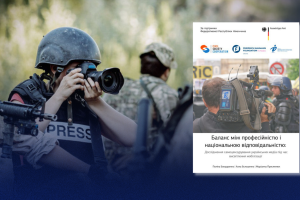The poll was conducted by the Democratic Initiatives Foundation from April 15 to May 1, 2020 among representatives of public organizations. A total of 75 responses were received.
Online press-conference “Civil Society in Times of COVID-19 Pandemic: How CSOs Deal With New Reality?” is conducted by the Ilko Kucheriv Democratic Initiatives Foundation as a part of USAID/ENGAGE activity, which is funded by the United States Agency for International Development (USAID) and implemented by Pact in Ukraine. The contents of the event are the sole responsibility of Pact and its partners and do not necessarily reflect the views of the United States Agency for International Development (USAID) or the United States Government.
- Surveyed representatives of public organizations generally rated the current level of development of civil society in Ukraine as average.
- Experts noted that the epidemic outbreak had certain influence on the civic activism of people, only about 20% did not agree with this statement (average score - 2.8 points on a 5-point scale from 1 - completely agree, up to 5 - completely disagree).
- Statement that the outbreak showed people their capabilities and strength has garnered an equal number of responses both in favour and against it.
- Half of the respondents (50%) agreed that the pandemic has multiplied "social capital" among the public- human connections, solidarity, mutual trust and helped to develop skills and technologies of self-organization.
- Experts didn’t reached a common opinion on how CSOs behaved during the pandemic. A third of them agreed that a number of NGOs and public leaders have proven themselves to be successful and effective, and become better known among society during the pandemic, another third of respondents believe that there were no changes, and the rest hold an intermediate view. However, only a quarter of experts agree that new social movements, organizations and new leaders emerged during the coronavirus pandemic, and do not believe that the influence of party-political structures and independent civic structures in society has changed significantly.
- The majority also agreed that the fight against the epidemic unveiled the willingness of citizens to provide financial support to those initiatives, that they consider important (37%) and only 19% of experts disagreed with this statement.
- According to experts, the main priorities of NGOs amidst the pandemic are the monitoring of the governmental activities and the protection of vulnerable social groups. NGOs should also focus on providing people with legal and other assistance aimed at defending their rights, conduct independent analytical research, and propose ways for the resolution of social issues.
- Activity of most public organizations has changed amidst the COVID-19 epidemic in Ukraine. Providing information on the pandemic became their main activity. In general, the role of civic activists in social change was highly rated by respondents - 7 out of 10 maximum points.
- According to the majority of surveyed experts (70%), joint activities should become the basis for relations between civil society and the state during a crisis. Only 20% believe that NGOs should focus on constructive criticism amidst this situation.
- Half of the respondents see new opportunities for community development during the COVID-19 pandemic. According to the experts, there are new opportunities for cooperation with the use of the latest technologies and remote formats, assistance to vulnerable groups and counseling, as well as for combating fakes.
- Vast majority of respondents named the active interaction with the media and appeal to the world community and international organizations as the main mechanisms for organizations to influence the government effectively. They also mentioned the development and promotion of materials for policy analysis and relevant recommendations and the formation of strong unions (association, movements) of public organizations.
- Interviewed experts stated, that the reluctance of the authorities to cooperate, prejudice against NGOs, passivity and indifference of the population and non-transparency of the authorities and lack of information about its decisions.are the main problems that undedrmine cooperation between NGOs and the authorities.
- NGOs should focus primarily on protecting civil rights and freedoms, as well as on government control and anti-corruption.
- Respondents noted, that the protection of their rights and interests are the key motivation for people to participate in the activities of public organizations and associations and create public initiatives. In second place – need for public control over the activities of government, in third place - concern for the common good and desire to help other people.
- According to respondents’ opinion there are certain constraints for civic engagement people’s participation in activities of public organization, such as indifference, passive attitude towards public life, and general distrust in ability to protect own rights and interests.








